CLAS 353
September 3, 2024

Publius Vergilius Maro: 4th-5th century CE Manuscript of Aeneid (19 BCE)
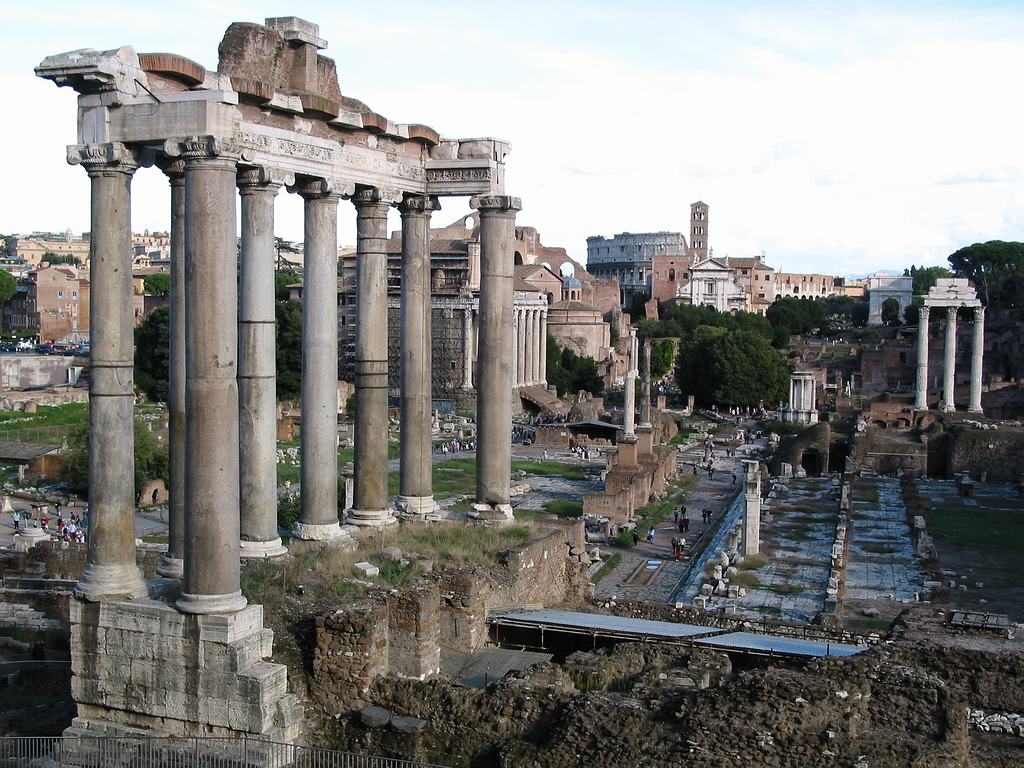
Roman Forum (today)
Rome: city-state founded 753 BCE (April 21); beginnings of Latin Literature (3rd century BCE)
- Punic Wars, Rome vs. Carthage (264-146 BCE); literature & acquisition of Mediterranean empire, (inter)national identity
- Latin literature derivative (Graecia capta ferum victorem cepit, “Greece, captured, captivated her savage conqueror,” Horace, Epistle 2.1.156); creative re-working of Greek sources for Roman audiences ("intertextuality")
- Livius Andronicus (drama, 240 BCE); Roman Epic begins with translation of Homer's Odyssey in Saturnian meter (Odysseus & son Telegonus by Circe viewed as founders of Italian cities):
- first Roman national epic: Ennius (239-169 BCE), Annals (15 books, fall of Troy to 169 BCE in Homer's dactylic hexameter)
- Aeneas, Troy, Rome
Homer, Iliad 20.302ff. (Poseidon's prophecy): "It is destined that he shall be the survivor, / that the generation of Dardanus shall not die . . . the might of Aeneas shall be lord over the Trojans, / and his sons' sons, and those who are born of their seed hereafter."
Dionysius of Halicarnassus, Roman Antiquities 1.48.3-4
But Menecrates of Xanthus [4th century BCE historian] says that Aeneas betrayed the city to the Achaeans out of hatred for Paris and that because of this service he was permitted by them to save his household. His account, which begins with the funeral of Achilles, runs as follows: "The Achaeans were oppressed with grief and felt that the army had had its head lopped off. However, they celebrated his funeral feast and made war with all their might until Ilium was taken by the aid of Aeneas, who delivered it up to them. For Aeneas, being scorned by Paris and excluded from his prerogatives, overthrew Priam; and having accomplished this, he became one of the Achaeans."
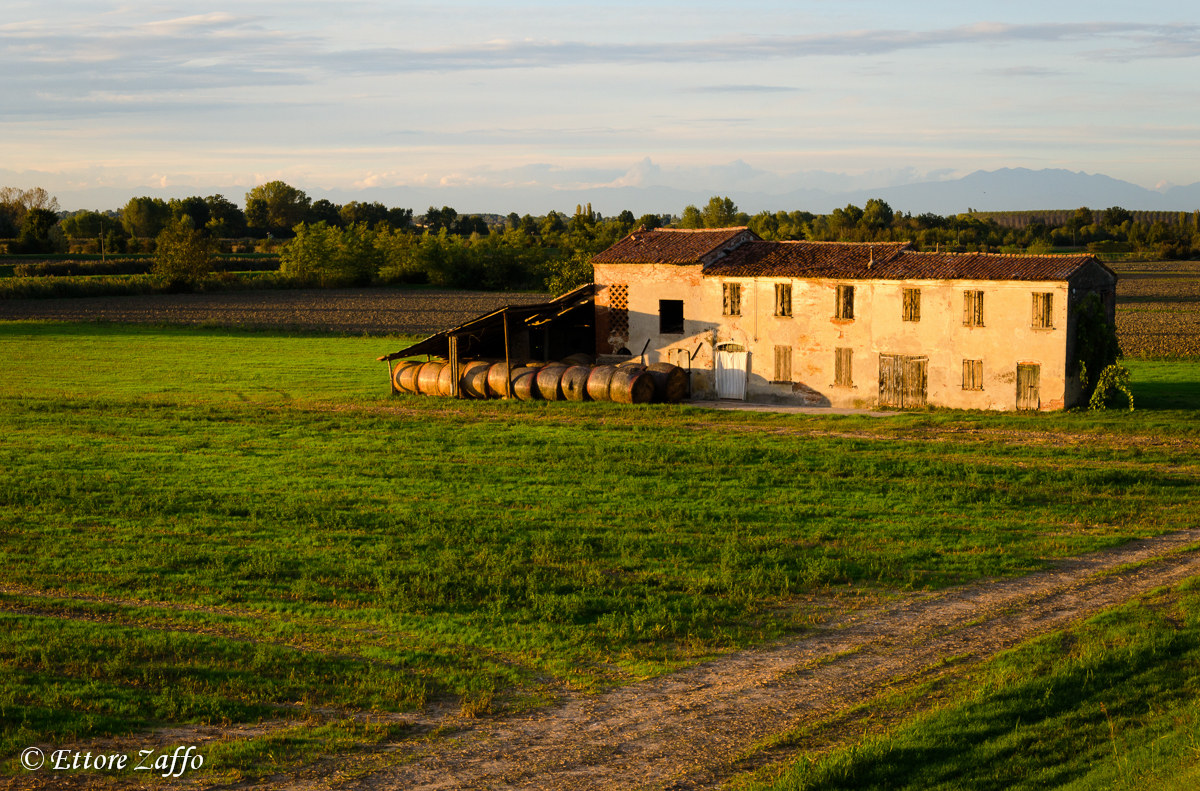
Vergil (70 BCE-19 BCE), born in Mantua, Italy
Cultural-historical moment of Aeneid
- Aeneid follows decades of civil war: reconstruction text
- Roman Revolution: republic (oligarchy) > empire (autocracy); income equality, class & political conflicts, failure of institutions, emergence of strongmen & personal armies in 1st century BCE
- Julius Caesar vs. Pompey (Lucan) > Caesar becomes "Dictator for life"; further civil war after Caesar's assassination in 44 BCE
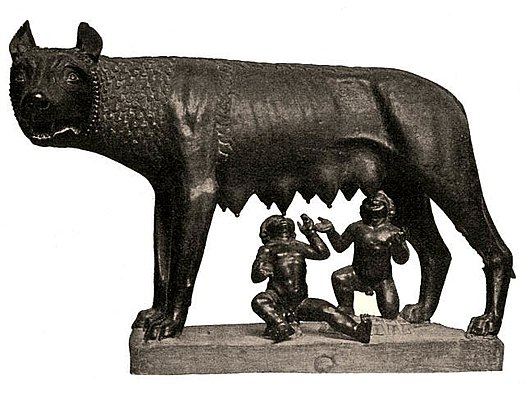
- social disruption, cycles of revenge, punishment of political enemies; the "curse" of Romulus & Remus culminates in Octavian's (= future Augustus) defeat of Mark Antony & Cleopatra in 31 BCE at Battle of Actium
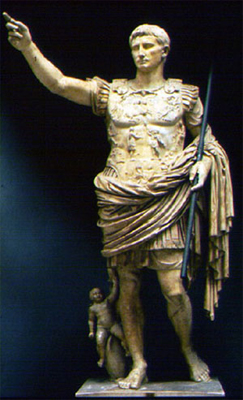
Augustus of Prima Porta (1st century CE)
- Augustus Caesar (63 BCE-14 CE) first emperor; "refounding" Rome, propaganda denies civil war; new "golden age" of peace/prosperity; emperor's reputation remake
- Vergil & Augustan regime (patron Maecenas): Aeneid retells Rome's mythic founding from hindsight of contemporary history (= mythic model for reconstruction of Roman society in 1st century BCE)
- Aeneid: begun ca. 30 BCE, unfinished at Vergil’s death in 19 BCE (58 unfinished lines); project = replace Ennius’ Annals as Roman national epic & rival Homer as the epic poem of antiquity
- Aeneid: national epic in traumatic aftermath of civil war: propaganda? contradictions & doubts about power & empire? multiple voices & perspectives?
Aeneid 1.257ff. (Jupiter's optimistic prophecy to Venus; cf. Athena's complaint to Zeus, Odyssey 5.5ff.)
"Let go your fear, Cytherea. Your people's fate
remains unchanged: you'll see Lavinium and
its promised walls, you'll raise great-souled Aeneas
to the stars. I haven't changed my mind.
Since this worry gnaws at you, I'll tell you more,
and unroll the secrets of the fates. Your son
will wage wide war in Italy, subdue
ferocious tribes, and give them walls and customs . . .
[Jupiter describes events down to Rome's founding by Romulus (753 BCE)]
. . . On them [Romans] I set no boundaries of time or space.
I've granted empire without end. Even cruel
Juno, terror of the land and sea and sky,
will change her plans and (like me) favor Romans:
people of the toga, rulers of the world.
So I've decreed. As years slip by, an age
will come
when Assaracus' house will conquer
Argos and crush Phthia and famed Mycenae.
Trojan Caesar will be born, of lovely Venus' line,
whose rule will reach all shores, his fame the stars
—Julius, a name passed down from the great Iülus. [cf. Julian family]
Freed from worry, you'll greet him in the skies.
He'll come laden with Eastern spoils, and men will pray
to him; harsh centuries of war will cease.
Ancient Trust and Vesta, Remus and Quirinus
will set down laws; the awful iron Gates of War
will close. Inside, impious Rage, crouched on
brutal weapons, tied up with a hundred knots
of bronze, will roar from blood-stained jaws."
[Temple of Janus closed in absolute peacetime, as in 29 and 25 BCE]
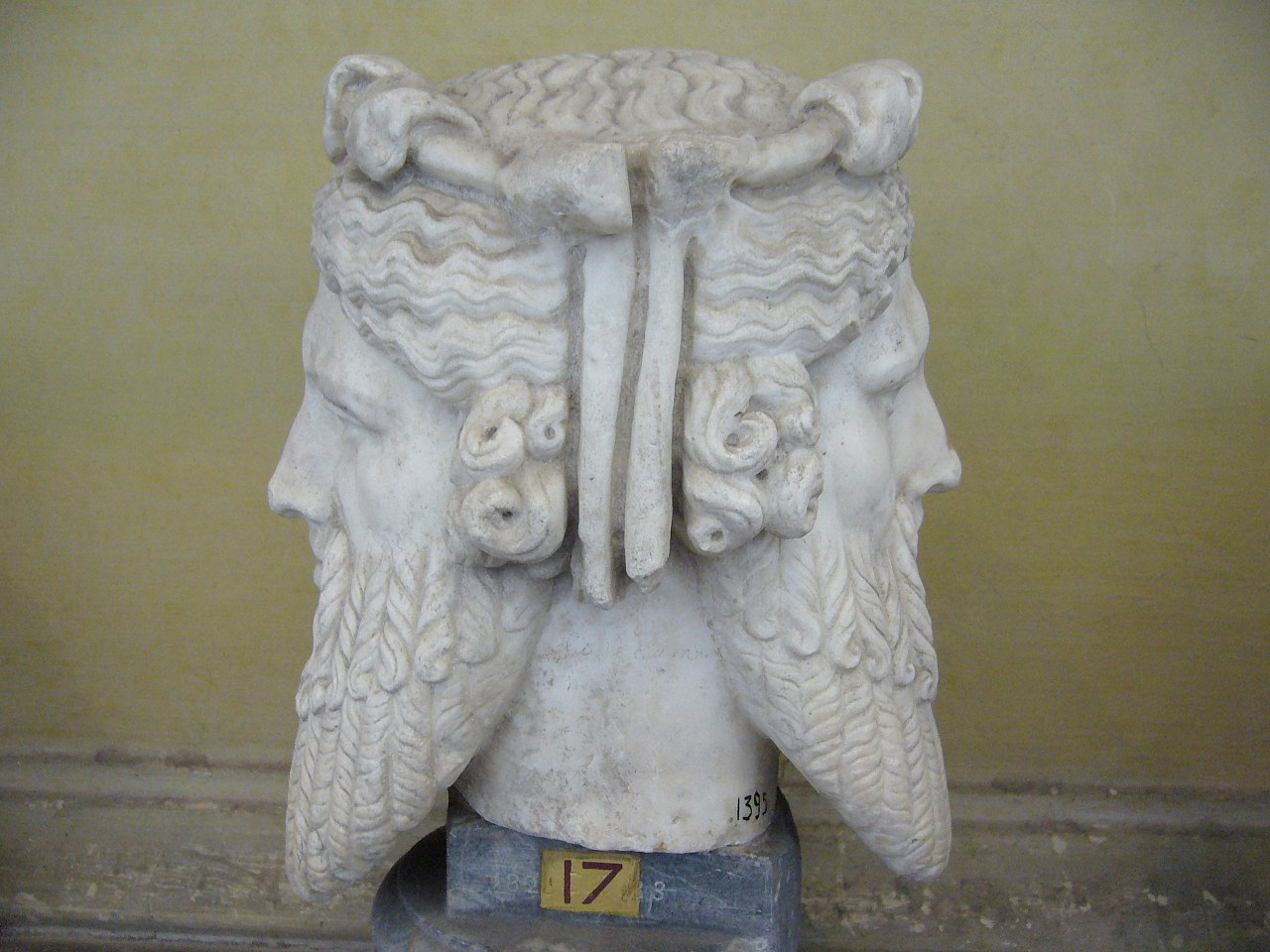
The Roman God Janus (doors, gates, new beginnings)
Aeneid's reception as European & American colonialist/imperialist text of nationalist destiny


Insurrectionist in US Senate Chamber (January 6, 2021)
- Aeneas as hero of New World (cf. "manifest destiny", "American exceptionalism")
ANNUIT COEPTIS ("[he/she/it = God for Founders] favors (lit. "nods to/has nodded to") our undertakings;" Aeneid 9.625 = prayer to Jupiter, Vergil's Georgics 1.40 = poet's prayer to Octavian)
NOVUS ORDO SECLORUM ("a new order of ages [is born]," Vergil, Eclogue 4)
John Smith, The Proceedings of the English Colony in Virginia (Jamestown, 1612; 12 chapters/prose Aenied)
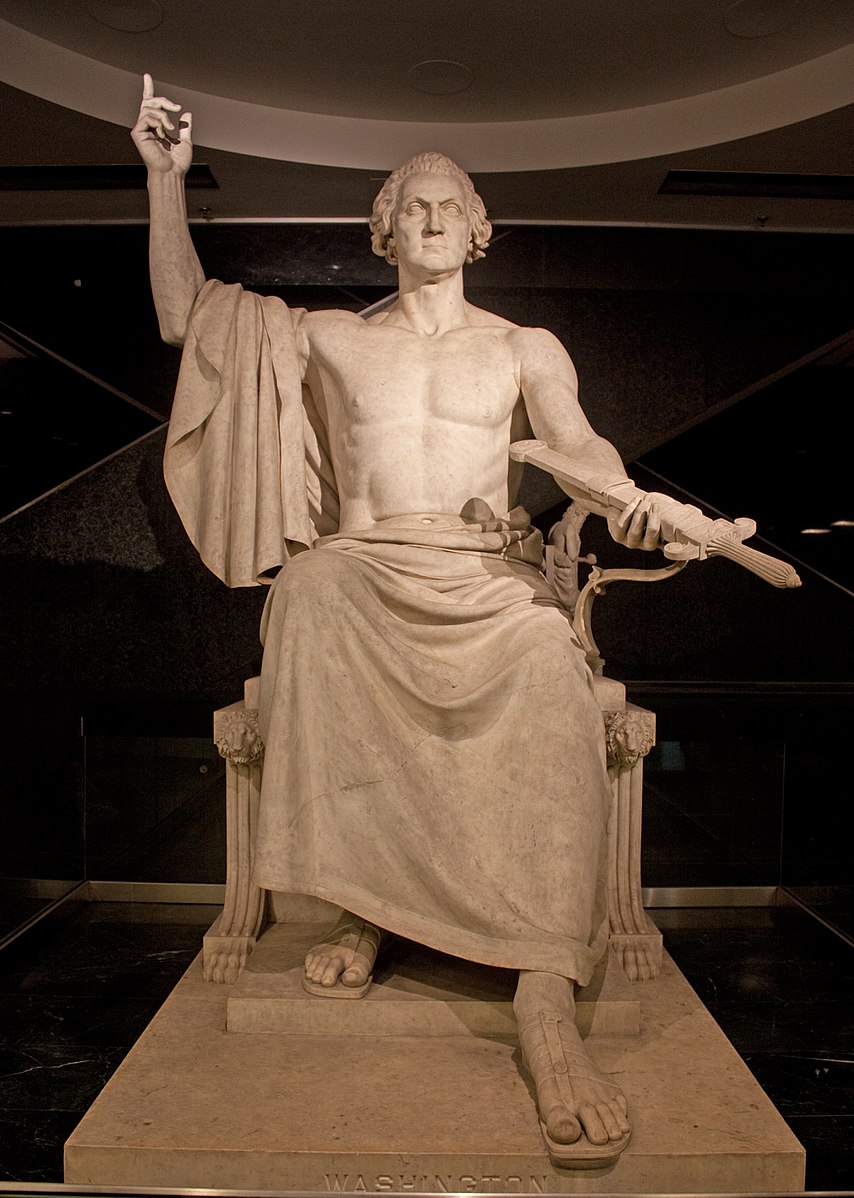
Greenough, George Washington (1840)
Annis Boudon Stockton's poem, "Addressed to General Washington in the year 1777"
Not good Aeneas who his father bore,
And all his household gods from ruined Troy,
Was more the founder of the Latian realm,
Than thou the basis of this mighty fabric
Now rising to my view, of arms, of arts;
The seat of glory in the western world.
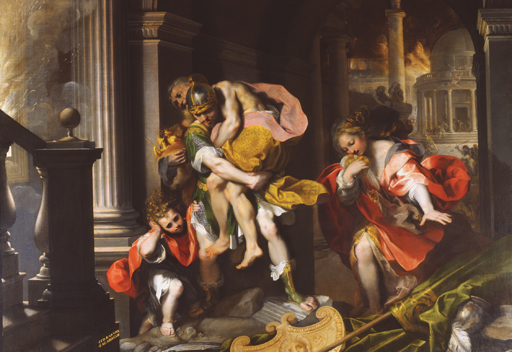
Barocci, Aeneas' Flight from Troy (1598)
Vergil's Aeneas: hero of duty, fate, history & suffering: refugee from Troy, harassed by goddess Juno & seeking "promised land"
- Aeneid: Vergil's Iliad & Odyssey (in 12 books)
Aeneid 1.1
arma virumque cano, “My song is of war and a man . . .” [Aeneas vs. Achilles, Odysseus?]
Google Map of Aeneas' Journey

Aeneid 1.1ff. (epic's program)
My song is of war and a man: a refugee by fate,
the first from Troy to Italy's Lavinian shores,
battered much on land and seas by blows from gods
obliging brutal Juno's unforgetting rage;
he suffered much in war as well, all to plant
his town and gods in Latium. From here would rise
the Latin race, the Alban lords, and Rome's high walls.
Remember for me, Muse. Tell me the reasons. What pain,
what insult to her power, moved the queen of gods
to drive a man famous for piety through misery
on misery? Can such anger grip gods' minds?
[Juno's grievances (3)?]
. . . Enflamed by this, she barred from Latium
the sea-crossed Trojans, the few left by the Greeks
and cruel Achilles. They roamed for many years,
over many oceans, forced on by the Fates.
To found the Roman race required such great effort.
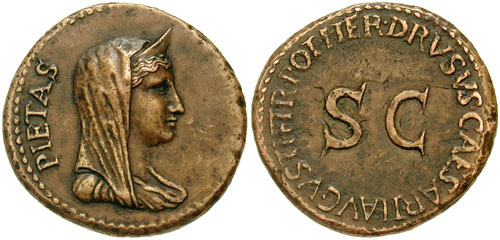
L: Livia (wife of Augustus) as Pietas (22-3 CE)
- Aeneas as the pius hero of Roman pietas (introspective hero of responsibility, e.g. secret grief for lost comrades, 1.220-3)
Aeneid 1.94-9 (Aeneas’ first appearance; cf. Odyssey 5)
“Three and four times fortunate, all you who died
by Troy's high walls under your fathers' gaze!
O Diomedes, bravest of the Greeks! [cf. Iliad 5.311ff.]
I wish I'd fallen on Troy's fields, my blood spilled
by your strong right hand, where fierce Hector perished
on Achilles' spear, and huge Sarpedon too."
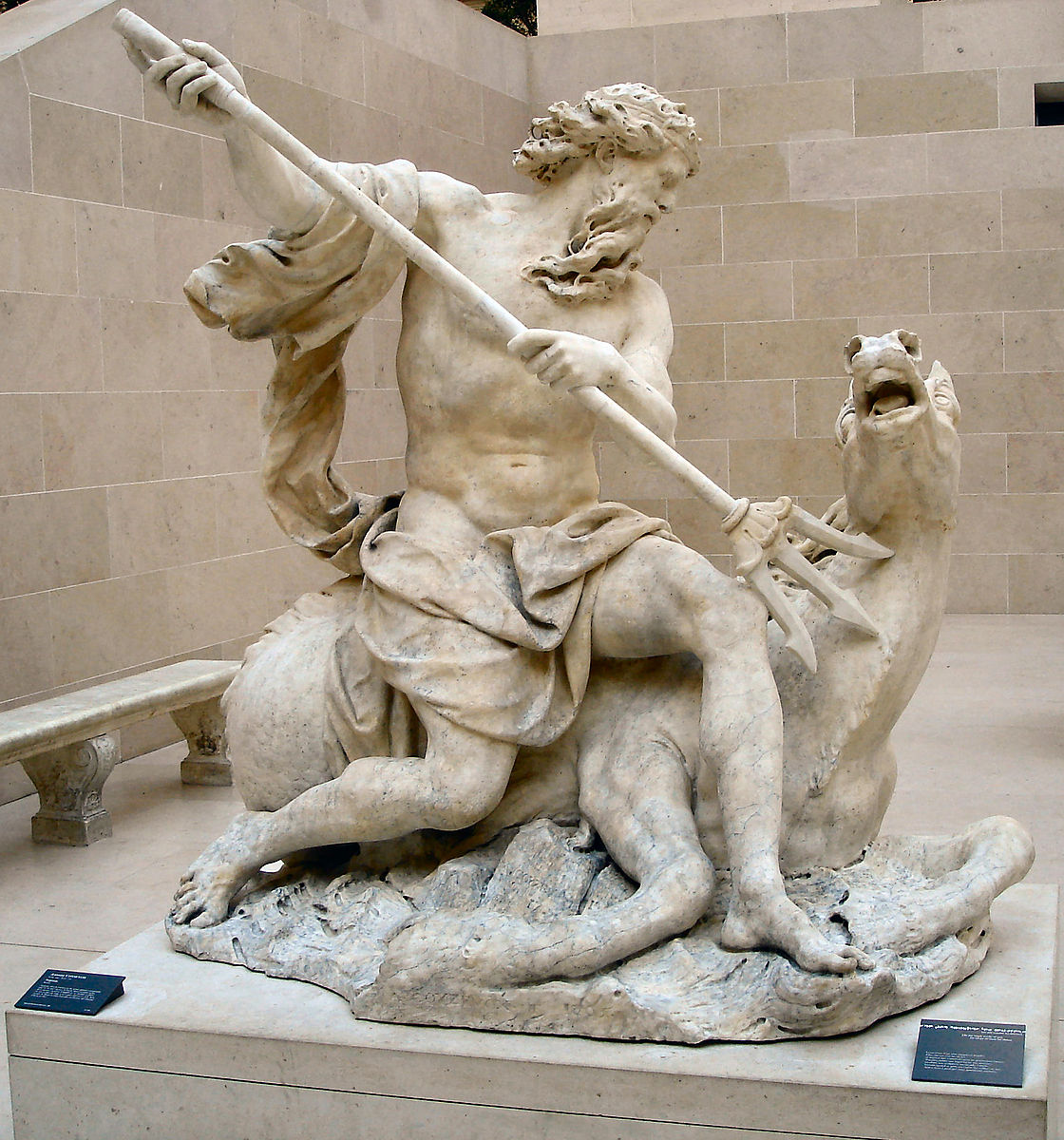
Coysevox, Neptune (1705)
- Aeneid's first simile: Neptune & winds ("Just as riots often fester in great crowds . . . ", 1.148ff.)?
- Aeneas as a spectator at Juno's temple in Carthage: ekphrasis (Dido's construction project)
Aeneid 1.459-63 (Trojan suffering, loss; compensation through art, memory, memorialization)
He stopped in tears: "Achates, what place on earth,
what land isn't steeped in what we've suffered? Look:
the world weeps, and mortal matters move the heart. [sunt lacrimae rerum, lit. "there are tears for things"]
Let go your fear. This fame will bring safety."
Aeneid 1.485-8 (Hector's death)
Aeneas groaned deep in his heart, when he saw
the spoils, the chariot, the very body of his
friend, and Priam stretching out defenseless hands.
He saw himself as well, mixed in with the Greeks . . .
- Dido and Aeneas: commonalties (Venus' tale to Aeneas, 1.314ff.)? Tyre, Sychaeus, Pygmalion?
- Venus' plan for Dido (1.657ff.)?
Aeneid 2: Aeneas as narrator (cf. Odysseus among the Phaeacians, Odyssey 9-12)













